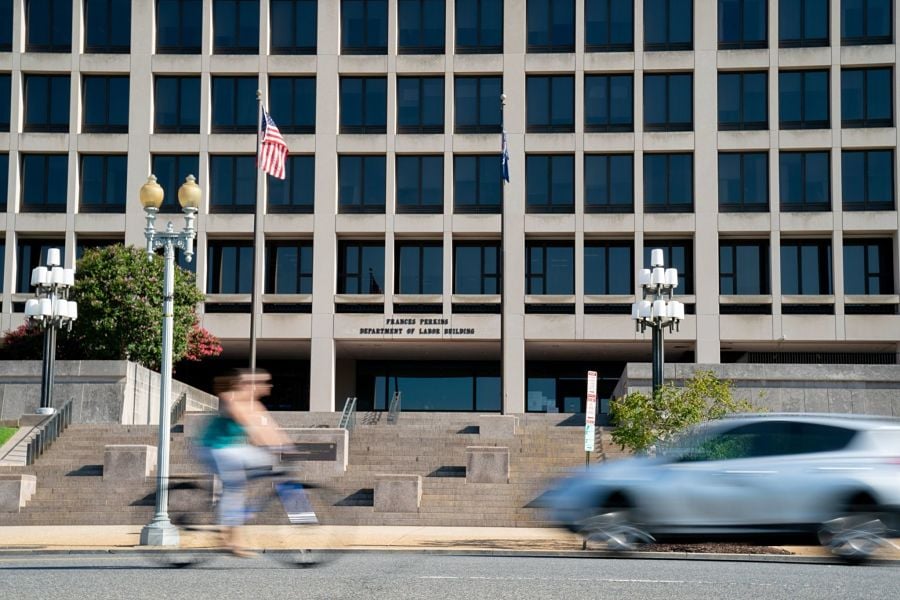

A Department of Labor official said the agency’s next attempt at setting investment advice standards for retirement accounts will not just be a rehash of previous fiduciary rules.
“We’re intentionally referring to it as the retirement security rule rather than the fiduciary rule,” DOL assistant secretary Lisa Gomez told reporters Monday on the sidelines of a conference in Washington about retirement financing sponsored by TIAA. “The reason is we want to signal … that this is not a regurgitation of the old rule.”
In September, the DOL sent a proposal formally titled “conflict of interest in investment advice” to the Office of Management and Budget for review. The abstract says the measure would revise the regulatory definition of the term “fiduciary” to “more appropriately define when persons who render investment advice for a fee to employee benefit plans and IRAs are fiduciaries within the meaning” of federal retirement law.
If the OMB approves the proposal, the DOL will release it for public comment — a move that observers expect to occur later this month.
It would mark another step in the agency’s efforts over more than a decade to reform advice rules for retirement investing. The goal has been to ensure financial advisors put their clients’ and customers’ interests in building a nest egg ahead of advisors’ revenue interests.
An Obama administration fiduciary rule was struck down by a federal appeals court. The Biden DOL has let stand a Trump administration version of the rule but indicated when it did so that more rulemaking was coming.
Gomez did not provide details about how the latest proposal would differ from previous versions nor did she confirm a timeline.
“It’s a high priority for the White House and for the department, so you can expect something very soon,” said Gomez, director of the Employee Benefits Security Administration. “We are trying to protect retirement savers. This is a new approach. Stay tuned.”
Getting the fiduciary proposal out to the public quickly is of the essence, said Micah Hauptman, director of investor protection at the Consumer Federation of America.
Government funding runs out in mid-November. If there's a shutdown, rulemaking would be suspended. Also, final rules that aren't promulgated by late next spring could be overturned by a new Congress and president after the election, depending on political makeup of the House, Senate and White House.
“We’ve been sending the message that the rule has to be published before another shutdown,” said Hauptman, who recently met with OMB officials. “We want to ensure this administration is in a position to zealously defend this rule throughout the [rulemaking] process.”
Representatives of the Insured Retirement Institute will meet with OMB officials on Friday. They will urge the agency not to approve releasing the fiduciary proposal for public comment.
The organization, which represents the annuity sector, said the advice landscape has changed significantly since the Obama administration issued its final fiduciary rule in 2016. For instance, the Securities and Exchange Commission promulgated Regulation Best Interest, the broker standard of conduct, in 2019, and a revised annuity suitability model rule has been adopted by many states.
“The DOL has offered no evidence of actual gaps in the current regulatory framework that are resulting in consumer harm,” Jason Berkowitz, IRI chief legal and regulatory affairs officer, said in a statement. “Instead of new rules, the DOL and other regulators should focus on actively and aggressively enforcing the existing rules.”
IRI and other insurance industry groups also assert the DOL rule would harm lower- and middle-income workers because fiduciary requirements would significantly raise the cost of investment advice.
The key provision likely will involve defining advice to transfer retirement funds from company plans to individual retirement accounts as fiduciary.
Strengthening rules around rollovers is a key part of the new proposal, Hauptman said. He also wants the proposed rule to address advice to retirement plans and insurance products that aren't defined as securities, such as fixed index annuities.
“Assuming the rule checks all those boxes, it’s pretty likely we’ll support it,” Hauptman said. “I’m optimistic.”
The Trump rule revived a five-part test that says only ongoing advice can be fiduciary, rather than a one-time rollover recommendation. A preamble to the measure, however, suggests one-time rollover advice could establish a fiduciary relationship.
“The challenge is if they make [the Trump rule] more restrictive and add additional obligations,” said Lance Schoening, director of policy at Principal.
But if the DOL does so, it would be flying in the face of recent court rulings that struck down the Trump administration guidance that a one-time rollover recommendation is fiduciary advice, Schoening said.
“It will be extremely interesting to see if the department tries to eliminate the regular-basis provision,” he said. “How do they think this is justified under law today?”

Rajesh Markan earlier this year pleaded guilty to one count of criminal fraud related to his sale of fake investments to 10 clients totaling $2.9 million.

From building trust to steering through emotions and responding to client challenges, new advisors need human skills to shape the future of the advice industry.

"The outcome is correct, but it's disappointing that FINRA had ample opportunity to investigate the merits of clients' allegations in these claims, including the testimony in the three investor arbitrations with hearings," Jeff Erez, a plaintiff's attorney representing a large portion of the Stifel clients, said.

Chair also praised the passage of stablecoin legislation this week.

Maridea Wealth Management's deal in Chicago, Illinois is its first after securing a strategic investment in April.
Orion's Tom Wilson on delivering coordinated, high-touch service in a world where returns alone no longer set you apart.
Barely a decade old, registered index-linked annuities have quickly surged in popularity, thanks to their unique blend of protection and growth potential—an appealing option for investors looking to chart a steadier course through today's choppy market waters, says Myles Lambert, Brighthouse Financial.
